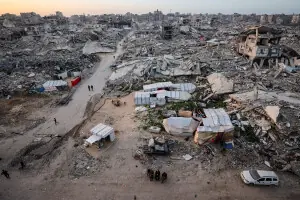Iran claims right to self-defence after Israeli strikes kill two soldiers
5 min readIran said it was “entitled” to self-defence after an Israeli attack targeted military sites in the Islamic republic on Saturday, causing “limited” damage and killing two soldiers, almost a month after Israel vowed to avenge a missile barrage that raised fears of a full-scale Middle East war.
The Israeli military said its retaliatory air strikes hit Iran’s missile manufacturing facilities, missile installations and other systems in several regions. It warned Iran it would “pay a heavy price” if it responded.
A semi-official Iranian news agency vowed a “proportional reaction” to the Israeli moves against Tehran.
Iranian media reported multiple explosions over several hours in the capital and at nearby military bases, starting shortly after 2am (10:30pm GMT on Friday).
Before dawn, Israel’s public broadcaster said three waves of strikes had been completed and that the operation was over.
Iran’s air defence force on Saturday confirmed an Israeli attack had targeted several military bases. The armed forces said later two soldiers were killed in the strikes.
“This fake regime (Israel) attacked parts of military centres in Tehran, Khuzestan and Ilam provinces,” it said in a statement, adding the attack “caused limited damage” while being intercepted.
Iranian state television had reported blasts around the capital due to the “activation of the air defence system” against an Israeli attack.

Explosions heard in various locations around Tehran
Explosions were heard in various locations around Tehran as tensions escalate in the region with suggestions that Israel may attack Iran at any moment.
Reports indicate that these incidents occurred following recent military actions, heightening concerns among residents and prompting discussions on social media regarding potential implications for security and stability.
Local sources noted multiple loud blasts, leading to speculation about their origin, with some attributing them to ongoing conflicts in the area.
Authorities have yet to confirm the cause of the explosions or the extent of any damage.
The situation in Iran remains fluid as military activities in the region continue to evolve, drawing attention from international observers and raising questions about the implications for regional stability.
Pakistan condemns Israeli strikes on Iran
Pakistan condemned Israeli strikes on military targets in Iran on Saturday, saying Israel bore “full responsibility” for escalating the conflict in the Middle East.
“Pakistan strongly condemns Israel’s strikes against the Islamic Republic of Iran in the early hours on Saturday,” its foreign ministry said in a statement.
“These strikes undermine the path to regional peace and stability and also constitute a dangerous escalation in an already volatile region.”

It added that “Israel bears full responsibility for the current cycle of escalation and expansion of the conflict”.
Since the deadliest attack in its history on October 7, 2023, Israel has been fighting Hamas in Gaza, and since late last month, it has been at war with Hezbollah in Lebanon.
Pakistan, an ally of Israel’s key backer the United States, shares a long border with Iran.
Prime Minister Shehbaz Sharif said he was “deeply worried by the recent act of Israeli aggression against Iran”.
“Pakistan stands with Iran and its other neighbors in pursuit of peace and urges all parties to act with restraint to avoid further escalation,” he said in a post on the social media platform X on Saturday.
Israel warns Iran against responding
“In response to months of continuous attacks from the regime in Iran against the State of Israel right now the Israel Defence Forces is conducting precise strikes on military targets in Iran,” Israel’s military said in a statement announcing the attack.
The military said later it had completed its “targeted” attacks in Iran, striking truck missile manufacturing facilities and surface-to-air missile arrays, adding its planes had safely returned home.
“If the regime in Iran were to make the mistake of beginning a new round of escalation, we will be obligated to respond,” the military said.
Targets did not include energy infrastructure or Iran’s nuclear facilities, a US official said.
US President Joe Biden had warned that Washington, Israel’s main backer and supplier of arms, would not support a strike on Tehran’s nuclear sites and had said Israel should consider alternatives to attacking Iran’s oil fields.
Iranian authorities have repeatedly warned Israel against any attack.
Iran is “entitled and obligated to defend itself against external aggressive acts”, its foreign ministry said on Saturday after Israeli airstrikes on Iran’s military targets.
Calling the Israeli attack a violation of international law, the ministry said in a statement that Tehran “recognises its responsibilities towards regional peace and security”.
Earlier, citing sources, the semi-official Tasnim news agency said there was “no doubt that Israel will face a proportional reaction for any action it takes”.
Flights diverted over Iran, Syria, and Iraq
In response to intensified Israeli strikes on military targets in Iran, airspace across Iran, Syria, and Iraq has been closed to all flights.
This extraordinary decision aims to secure the airspace amid rising regional tensions and will affect civilian, commercial, and non-operational military flights until at least Saturday morning.
Although Iran initially announced plans to reopen the airspace at 9 AM, the closure has now been extended indefinitely.
The Israeli attacks targeted significant military sites throughout Iran, prompting immediate reactions on Iranian social media, where users voiced concerns about potential further actions from the Israeli Defense Forces (IDF).
Images circulating online show passengers disembarking from grounded flights at Iranian airports, highlighting the disruption to regional air travel and the significant financial losses faced by airlines.
According to flight data, the distance from Israel to Tehran is approximately 1,600 kilometers.
With military jets like the F-16 and F-35 capable of reaching high speeds, the estimated flight time for a round trip from Tehran to Israeli airspace is around 50 minutes, potentially extending by 15 to 30 minutes if mid-air refueling is necessary.
Also, read this
Iran’s Khamenei denies involvement in Hamas attack on Israel
Iranians pour onto the streets in support of attack on Israel
Iran, Iraq suspend all flights
Iran and Iraq have suspended all flights following Israel’s announcement of airstrikes on Iranian military targets early Saturday morning.
Iraq’s transport ministry also suspended flights across all airports until further notice “due to regional tensions,” the Iraqi state news agency INA reported.
“In response to ongoing attacks from the Iranian regime against Israel, the Israel Defense Forces are currently carrying out targeted strikes on military sites in Iran,” stated the Israeli military.
“Flights will return to normal from 9:00 am (0530 GMT) on Saturday,” the spokesperson said.
Flights closed earlier over the Iran airspace has been resumed later on the Saturday morning.
For the latest news, follow us on Twitter @Aaj_Urdu. We are also on Facebook, Instagram and YouTube.



























Comments are closed on this story.